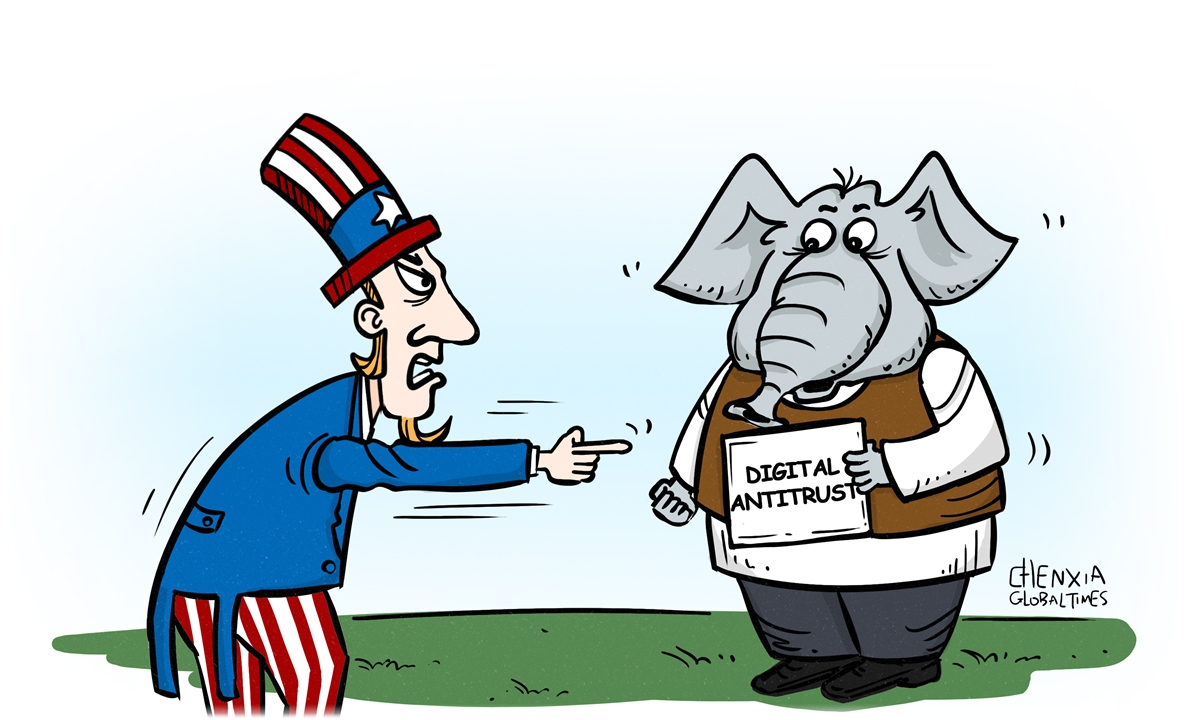US Big Tech lashes out at India; world needs coordinated digital rules

Illustration: Chen Xia/Global Times
The Asia Internet Coalition, an industry group that represents Meta, Amazon, Twitter, Google and other US big tech companies, has expressed dissatisfaction with the digital competition law recommended by the Indian Parliamentary Standing Committee on Finance in December, arguing that it is "regressive" and "may dampen digital innovation in India," Indian media outlet Business Standard reported on Monday.The backlash from US tech companies signals the standoff between Indian and US tech companies will intensify in 2023, with New Delhi stepping up regulation for the world's second most populous internet market, the Wall Street Journal reported last week.
It must be pointed out that there already is a growing trend of tightening regulations for the digital sector in many major economies. And dominant positions of US technological giants globally have also prompted concerns in many countries.
While making the recommendation for a digital competition law, the Indian parliamentary panel cited the EU's proposed Digital Markets Act and the US' American Innovation and Choice Online Act and the Open App Market Act. Western countries are also broadly making revisions to their regulation on big tech companies to close loopholes for the fast-developing sector.
For instance, in November 2022, the UK's Big Tech regulator, the Competition and Markets Authority, announced a market investigation on Apple and Google for effective duopoly on mobile ecosystems. In the same month, Germany's antitrust watchdog, Federal Cartel Office, widened antitrust probes of Amazon.
In the digital era, digital and internet technologies have increasingly become a critical driver for economic growth in many countries across the world. However, the broad application and commercialization of the technologies have led to negative impacts, including monopoly and violation of data privacy, and in some cases, have even challenged sovereignty and security of other countries.
Moreover, it is an indisputable fact that US technology giants such as Google, Amazon, and Meta are constantly eroding away international market share and harvesting global data dividends, while promoting the rapid development of the US digital economy and maintain the US' digital hegemony.
Amid growing risks, it is understandable that countries seek to step up their market regulation to secure national security, economic interests and consumer privacy in trans-border data transactions. However, taking unilateral actions is not the way forward to tackle the growing risks and tensions in the digital sector. Global coordination and integration in terms of global digital governance has become increasingly crucial.
The global digital industry is an open and closely connected one. Win-win cooperation is the only right way. Protectionism, exclusion and confrontation will only lead to a dead end. Only when countries strengthen communication and promote bilateral and multilateral digital governance cooperation can an open, fair, and non-discriminatory digital business environment be established to serve the development of digital industries in various countries.
More importantly, the formulation of global cooperation rules and transformation of global digital governance should not be decided by individual countries. When countries jointly build a peaceful and open cyberspace, they should adhere to certain principles. The most important one is to respect the cyber sovereignty of all countries. No country should rely on its technological advantages to seek digital hegemony, interfere in the internal affairs of other countries, engage in, condone or support its companies in cyber activities that endanger the national security of other countries.
For the future development of the digital economy, China, India and other developing countries should advocate digital multilateralism. All parties should adhere to the principles of negotiation not confrontation, inclusiveness not exclusiveness, and jointly expand common interests and explore the potential and vitality of digital economic cooperation.
The author is a reporter with the Global Times. bizopinion@globaltimes.com.cn
